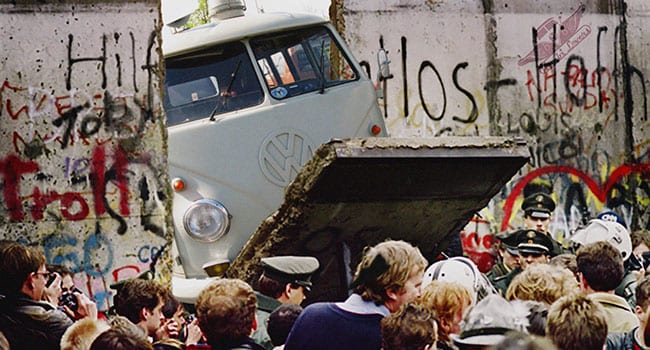 Nov. 9 marked the 30th anniversary of the fall of the Berlin Wall. This was most significant global event of my lifetime (I was born in 1962) and it’s worth remembering for many reasons.
Nov. 9 marked the 30th anniversary of the fall of the Berlin Wall. This was most significant global event of my lifetime (I was born in 1962) and it’s worth remembering for many reasons.
First, it’s significant to note why the wall fell. It simply couldn’t withstand the human desire for freedom. Throughout the communist bloc, people were refusing to accept the rhetoric that the state was supreme, that it trumped all, even the sacred nature of each individual.
While it’s true that there’s a certain ostalgia (“ost” meaning “east” in German) for the economic security of the communist state, no one is calling for the return of Stasi, the East German secret police, who spied on people and kept detailed records of many citizens.
On a global scale, the fall of the Berlin Wall signified the end of the Cold War. Many of us have forgotten the almost constant fear of nuclear Armageddon. I often tell my students that when I was their age, we didn’t know if 2019 would come. With the release of classified Soviet and American documents in recent years, it has become very clear how close we actually came to destroying ourselves.
Nuclear weapons remain a threat to global survival, but the world today can’t compare to the constant tension, the constant troop movement, the constant cloud that loomed over us every day.
As a person who simply wanted all people to be treated well, the fall of the Berlin Wall allowed for much greater honesty. During the Cold War, the Soviets and their allies were always wrong. They were always the ones who committed crimes against humanity. If one dared to question the actions of supporters of capitalism, one was labeled a communist, or was simply discredited and ignored.
This happened on university campuses and in the forests in developing countries. The Armenian Genocide could not be examined because Turkey (which was responsible for an estimated 1.5 million Armenian deaths) bordered the Soviet Union and was too valuable a Western ally to be questioned. East Timor, invaded by Western ally Indonesia, would not be discussed. Mobutu Sese Seko in Zaire was an African hero who kept godless communism from spreading to his mineral-rich country from neighbouring Angola.
There was little room for real dialogue. The communists were bloodthirsty and we were defending the world from the spread of its pestilence.
What a relief it was when this insidious veil was lifted from the world. True, it led to a period of tremendous political volatility throughout the 1990s, which resulted in further genocide. In many ways, we continue to pick up the pieces left after the end of the Cold War. The difference is that now matters can be discussed without anti-communist rhetoric. We can study the issues, put people on trial for crimes against humanity and find ways to move forward.
We have a very, very long way to go. We still don’t see members of G20 nations put on trial for their crimes against humanity. We still live in a world where war is a reality for far too many people and the threat of nuclear holocaust hasn’t been eliminated. We also face continued polarization between the haves and have nots, as well as an uncertain future for the environmental health of our planet.
In many ways, the fall of the Berlin Wall was only a starting point, but what a starting point it was! We can never forget the love of freedom and the demand for the respect of the rights of each individual that brought about its fall.
This spirit that brought down a once impenetrable wall continues to spread to all corners of the world. One can only imagine where we will be 30 years from now.
Troy Media columnist Gerry Chidiac is an award-winning high school teacher specializing in languages, genocide studies and work with at-risk students.
The views, opinions and positions expressed by columnists and contributors are the author’s alone. They do not inherently or expressly reflect the views, opinions and/or positions of our publication.


